Christian Conscience
Confronting Conflict with Humanity and Hope
How we’re leaning into humanitarian principles to make a difference in the Israel-Gaza crisis.
Lately, I’ve been getting questions from my family and friends about the ongoing conflict in Gaza. I know it can feel overwhelming, confusing, and downright heartbreaking. The scars of the Hamas attacks on Israeli farming communities last October are still fresh, innocent people have died in large numbers, and the war drags on with no end in sight. But amidst the chaos, your generosity has helped World Relief make an impact.
World Relief has directly supported many organizations on the ground. We’ve provided aid within Gaza, on the border in Egypt, and to Israelis and Palestinians on the West Bank. Here’s just a glimpse of what has been possible:
- Medicines and Medical Supplies: Over 50,000 people have received medicines, medical supplies or lifesaving healthcare.
- Water and Sanitation: We’ve provided latrines and water filtration systems to meet the needs of internally displaced people.
- Food and Basic Necessities: Countless families have received the essentials to survive this brutal war.
Of course, these conversations often come around to the hard questions. “What’s really happening?” and “What do you think?” In crises like this, there are so many conflicting reports and strong opinions on all sides. There are powerful forces at play with hardline agendas, but there are also humanitarians, like World Relief and our partners, working tirelessly to value and uphold the sanctity of every human life amidst the turmoil.
Humanitarians engage in these conflicts driven by a shared set of principles: humanity, impartiality, neutrality, and independence. These aren’t just words to us; they’re the very foundation of our work. This means we believe in:
- Humanity: Protecting life, health, and ensuring respect for all human beings; do no harm.
- Impartiality: Aid based solely on need, prioritizing the most urgent needs first.
- Neutrality: Addressing human suffering wherever it’s found, without taking sides.
- Independence: Humanitarian aid and action must be autonomous from political, economic, military, or other objectives that any actor holds.
There are several ways I invite my family and friends and the broader World Relief community to embrace these values. First, you can look for God in the face of those who suffer. Jesus taught us that when we serve those in need, we’re serving him (Matthew 25:40-45). All human beings are created in the image of God. This is the bedrock of humanity as a value, and the reason why we do whatever we can to protect life and health in conflict settings.
Second, you can acknowledge suffering and needs do not discriminate in a conflict. In your conversations, note suffering that happens to anyone, especially to those with whom you disagree.
Third, you can give. Even a few dollars might provide bandages for a wound, safe shelter, or emergency transportation.
Fourth, you can advocate for safe corridors for humanitarian aid. Delivering lifesaving aid in conflict zones like Gaza is incredibly challenging. Aid workers lives have been lost (some targeted and some due to the general lack of protection for civilians), barriers to aid have been erected, and the combined loss of life and damage to infrastructure has gravely hit even the most basic of services. Safe corridors for delivering aid are crucial, and we need those in power to commit to providing them.
Lastly, and most importantly, you can pray. While we may not have the power to change everything, your prayers are vital. They make a real difference. Your prayers join with the Holy Spirit, who works with the same power that raised Christ from the dead (Romans 8:26-27). It’s this faith and hope that keep me going, knowing that God is greater than anything that stands against us (Romans 8:31).
Your alignment with us in values, in conversations, in giving, in advocacy, and in prayer is a beacon of hope. Together, we can still make a difference in the face of this heartbreaking conflict, one act of generosity and love at a time.
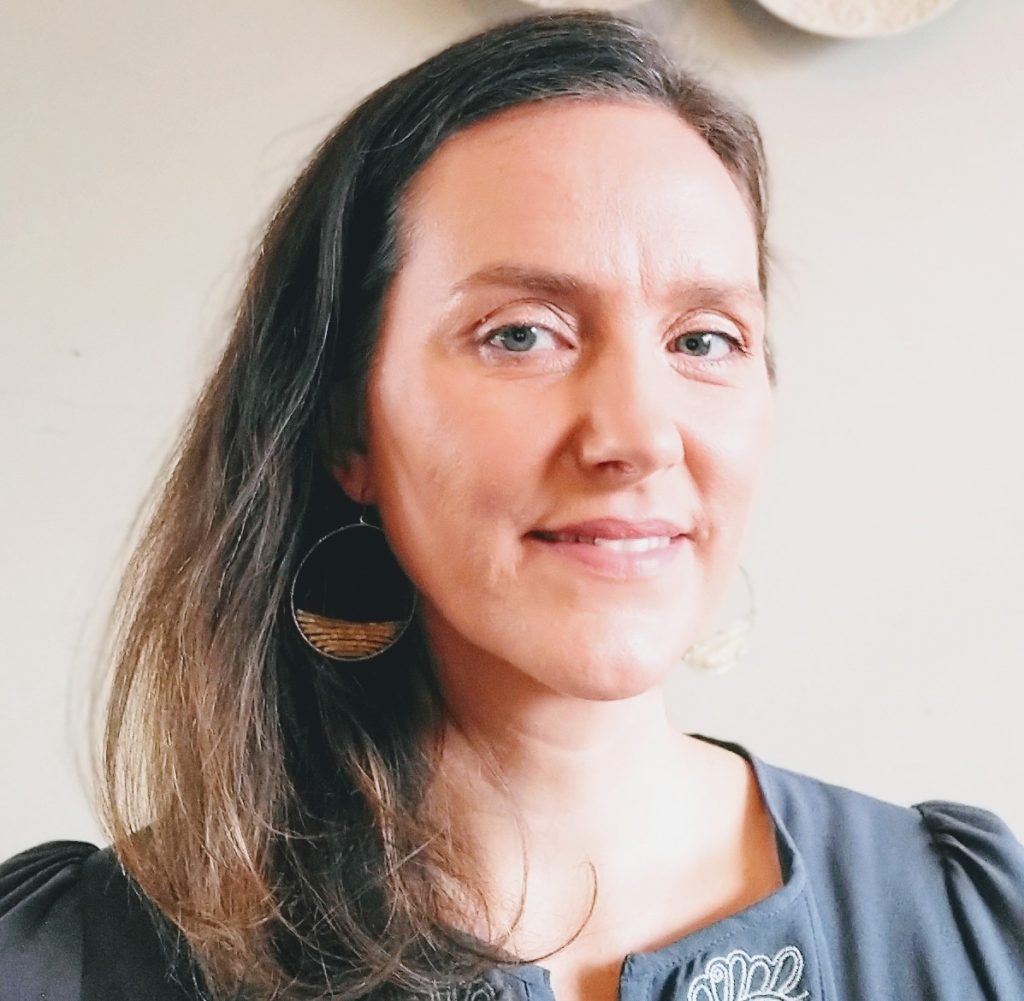
Emily Chambers Sharpe is the Director for Health, Nutrition, and WASH in World Relief’s International Programs Department. She has held various senior management and technical roles in humanitarian health and nutrition and community-based HIV programs. She has many years of experience with health and nutrition programs in conflict settings in Sudan and throughout the Middle East. Emily earned her MPH from Boston University School of Public Health. She lives in Charlotte, NC with her husband Rob and their three sons.
The Power of Perspective in Relationships
Every relationship you have holds the potential to change you. And when you grow your perspective to understand the experiences, thoughts, and values of others, those relationships hold the power to help change a community.
I’ve had many relationships throughout the years that have guided, challenged, encouraged, and shaped my life. And I’m sure you could list the names of several people who did the same for you. But it was one relationship that significantly impacted the trajectory of my life because it opened my understanding of the world and the people in it.
During high school, I was blessed to meet another young woman my age, an exchange student from Croatia. We got to know each other and became friends. One day I learned that her living situation was falling apart. She faced the blunt reality of being forced to move to another town and start over. Because our friendship had become an important part of my life, I felt compelled to do something. I proposed the idea to my parents that my friend move in with us.
I would like to think it was my persuasive skills that made them say yes. Rather, their openness was rooted in their love for God and for others – core tenants of our Christian faith. They welcomed her with open arms. Before long, I was sharing the master bedroom with my new friend who truly became like a sister to me for the rest of that school year.
“When your perspective is given the space to grow, it has the power to change you.”
We became friends for the same reasons most friendships begin: sharing interests and spending time together. We didn’t enter into a friendship with the intention that we would grow or change from it. But through the ebb and flow of our shared experiences, it naturally became mutually transformative.
Our friendship helped me become more of the person God invited me to be. She grew my perspective – and by doing so, I began to change into someone who values differences and wants to welcome others. My understanding that we are all beautifully made in the image of God, brimming with life and potential, continues to inspire me to this day in the work God has called me to do.
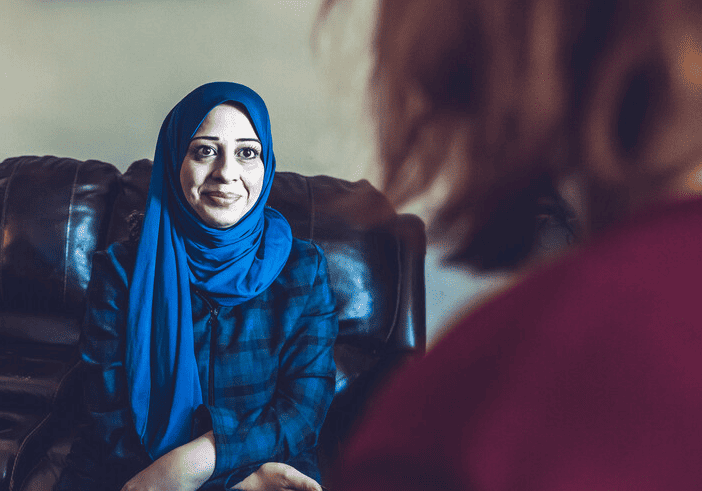
“Your perspective grows in the context of relationship and by your proximity to the stories of others.”
In my role at World Relief, I regularly get to listen to and learn from our refugee and immigrant neighbors. As we celebrate Refugee Awareness Month and World Refugee Day on June 20th, two World Relief staff members who came to the United States as refugees offered to briefly share their experiences. I believe listening to their stories – and other refugees’ stories like them – helps to broaden our perspective on the true impact that occurs when we choose to walk alongside our refugee neighbors as they rebuild their lives.
I celebrate these friends and the thousands of other refugees who have found themselves rebuilding a life in the wake of tragedy.
Every year millions of people are forced to leave their homes for hundreds of reasons and become refugees. Whether they’ve been persecuted because of their faith, their nationality, their gender or sexuality, or experienced extreme poverty or political oppression, they still bear the image of God. In spite of the story playing out in their lives at that particular time, their worth remains. We get to become a part of that story as they rebuild their lives in the U.S., and in so doing, discover how the image of God is alive in us as well.
“Your perspective grows when it becomes intentional.”
As I look back on my high school years, I’m so grateful for my parents’ willingness to listen to my friend’s story. They stepped out in faith and moved closer to her, choosing to do something they hadn’t done before by giving her a place in our home.
Their decision reflected an important truth about growing your perspective to build mutually transformative relationships. It takes intention to move out of your comfort zone into spaces where people are different from you. It’s in these spaces where you grow, learn, and transform. Yes, it can happen by accident, but it almost always requires a deliberate effort.
During this Refugee Awareness Month, let’s be people who are intentional. Let’s be people who celebrate our refugee neighbors. And let’s be people who celebrate and welcome those around us the way that God celebrates and welcomes us.
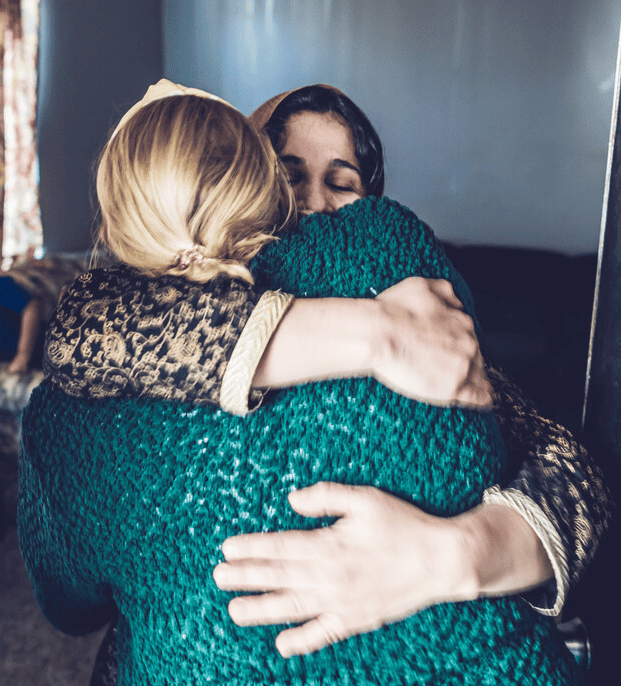
The Part You Play
By the end of September, World Relief Chicagoland expects to resettle over 400 refugees from all over the world and people like you have a part to play every step of the way. Through volunteering, donating needed items, or giving financially you can be a part of something greater, a truly welcoming community. To learn more about how to show welcome and celebrate Refugee Awareness Month, visit World Refugee Day 2023 – World Relief
Social Emotional Learning Equips Refugee Children and Their Families to Thrive
At World Relief, we are committed to advocating for refugees the opportunity to legally seek refuge in the United States. But our work doesn’t end there. We know that serving the refugee community requires caring for the whole person and their families.
As part of our bold vision to move Forward Together, we are determined to Go Deeper in our care for our refugee and other immigrant neighbors by addressing root causes of vulnerability and expanding our expertise in mental health.
Carrie Woodward, Foundations Partnerships Manager for World Relief Chicagoland, breaks down one of the trauma-informed mental health strategies: Social Emotional Learning.
At just four years old, Sam arrived in the United States with his family. Upon arrival, they were welcomed by World Relief Chicagoland. Like other refugees, the family arrived with hope and dreams for their future. the chance to rebuild in the United States did not erase the impact left by tragedy and trauma — even for a young child like Sam.
Refugee children carry their complex emotions and traumatic histories with them. This can make getting to a place of stability and happiness very challenging.
Even after coming to the U.S. Sam’s body and mind were marked by the trauma of his past, and he struggled to adjust. He had a lot of emotions that he did not understand or know how to express – so he lashed out in frustration. This left his parents feeling exhausted and overwhelmed, unsure of what to do. His mother told World Relief, “I feel helpless.”
The Challenges Refugee Children and Youth Face
For children, whose brains are still developing, the resettlement experience itself can be retraumatizing as they encounter language barriers, difficulty navigating community resources, lack of relational support and culture shock. Many refugees come from cultures where discussing mental health is taboo. This often means that busy parents like Sam’s who are processing their own trauma may not know how to support their children in recovering too.
Thankfully, with the help of community partners and volunteers, World Relief Chicagoland is equipping parents and children to grow and thrive through Social Emotional Learning (SEL).
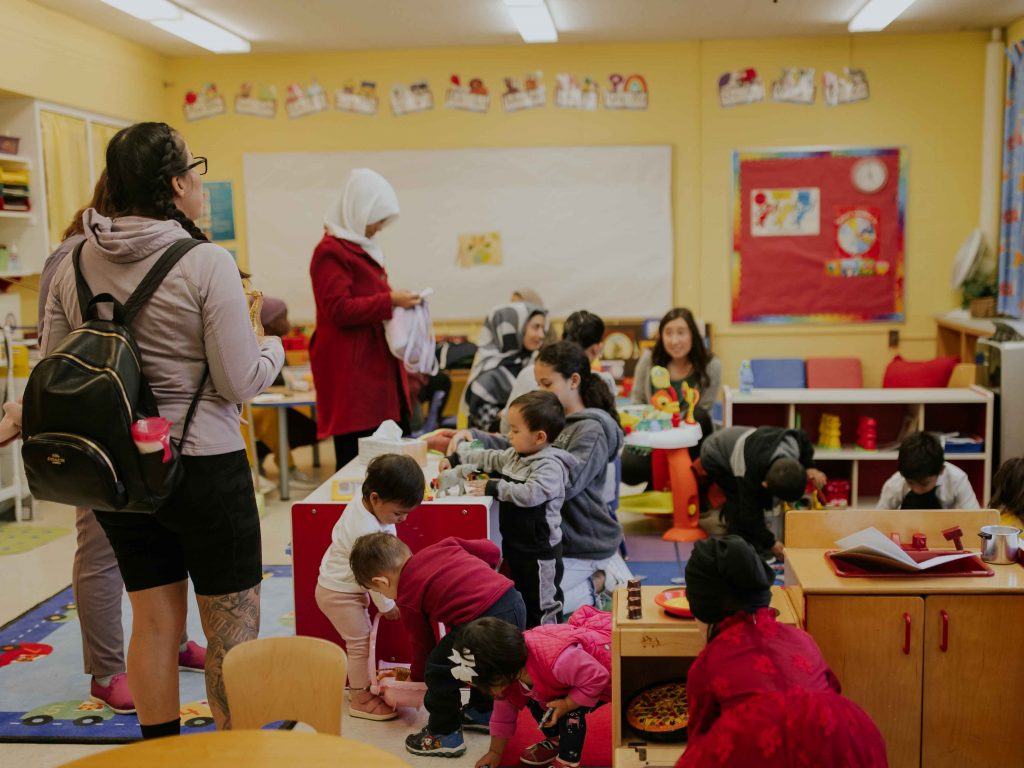
How Social Emotional Learning Changes Children’s Lives
Refugee children have often experienced chronic stress for months or even years at a time. Their stories are often marked with violence, poverty, death of loved ones and displacement. These factors create complex thoughts and feelings that can feel scary to explore. Yet, processing these emotions is key to moving forward.
Social Emotional Learning helps children process by focusing on five areas that impact every aspect of life: self-awareness, self-management, responsible decision-making, relationship skills, and social awareness.
Each of these areas impacts a child’s self-confidence, relationships and ability to cope with daily stressors. Research has shown that when compared to students who did not participate in SEL, those who engaged with SEL activities:
- Had better grades
- Showed more skills for managing anxiety and depression
- Behaved better in a classroom setting
- Expressed better attitudes towards themselves and others
These impacts have long-term, positive effects. One analysis showed that students who participated in SEL programs gained social emotional skills that led to higher levels of well-being 18 years later.
What Does SEL Look Like At World Relief?
World Relief Chicagoland incorporates SEL into age-appropriate activities such as:
- 10-minute guided check-ins to identify and reflect on how their bodies are feeling
- Writing, drawing, or speaking “I am” statements. Saying affirmations like “I am good at basketball!” or “I am a great big sister!” can build self-confidence
- Using a chart of expressive emojis to help preschoolers identify and describe feelings
- Coloring pictures in response to prompts like “Show us your family” or “Show your home
SEL is part of a holistic approach to mental health that addresses the specific emotional needs of immigrant and refugee youth.
“Equipping refugee children with the tools and treatment they need to adapt and grow through trauma forges a pathway for them to embrace emotion and learn how to process it in a way that feels safe and organic to their developmental level,” said Katie Schnizlein, Early Childhood Program Coordinator at World Relief Chicagoland. “This breaks down the barriers of layered emotion and devastating trauma…as they grow into the rest of life.”
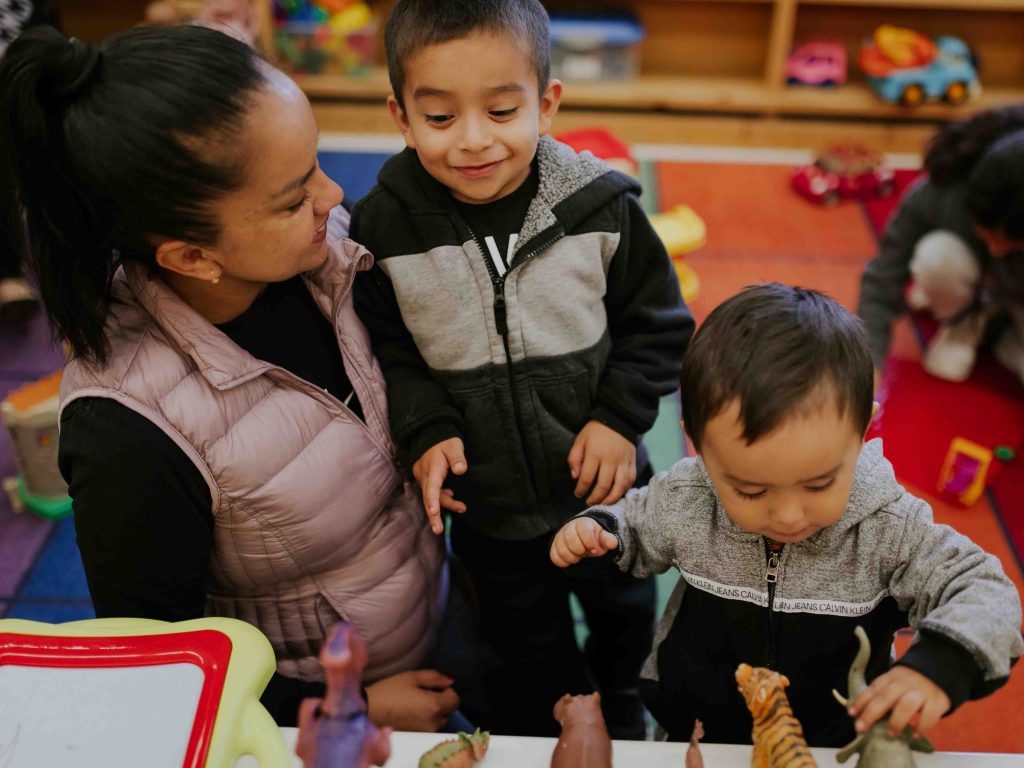
Preparing Children for Life
Ultimately, Katie says, “SEL ensures that children have services that cover mind, body and soul. Through SEL, children have the ability to grow in agency, autonomy, self-awareness, emotional regulation and the art of fitting into the world around them.”
In Sam’s case, SEL is part of the answer to the pain and the helplessness his parents felt.
Shortly after they arrived, Sam started attending a preschool and participating in World Relief’s Children & Youth program. He gained structure and relational support through his tutor and SEL activities, while his mother joined a World Relief-facilitated parenting group where she learned strategies to support her son socially and emotionally.
Thanks to this support system, now at five years old, Sam plays well with friends, is learning quickly in school and is working on naming and describing his emotions.
Make a Difference. Get Involved.
Volunteers in our Children and Youth program play an essential role in providing the relational and educational support refugee children need as they rebuild their lives. As an early childhood volunteer, youth tutor, or a summer club group leader, you can help make a difference.
Read more about the impact happening among children and youth:
How to Have Impact as a Volunteer Tutor
Summer Camp: Fun, Fellowship and First Responders
How Refugee Children Reshape Resettlement for Their Families

Carrie Woodward joined World Relief in 2021 in a role that engages foundation and business partners throughout the Chicago area. She studied community development and history at Covenant College. Her education informs her passion for asking questions and a desire to find evidence-based ways to help communities flourish. Prior to coming to World Relief, Carrie worked for an international development organization and an academic research lab in Arizona. She is an avid reader, podcast-listener and loves exploring Chicago’s many unique neighborhoods, playing pickleball and walking by Lake Michigan.
Social Emotional Learning Equips Refugee Children and Their Families to Thrive
At World Relief, we are committed to advocating for refugees the opportunity to legally seek refuge in the United States. But our work doesn’t end there. We know that serving the refugee community requires caring for the whole person and their families.
As part of our bold vision to move Forward Together, we are determined to Go Deeper in our care for our refugee and other immigrant neighbors by addressing root causes of vulnerability and expanding our expertise in mental health.
Carrie Woodward, Foundations Partnerships Manager for World Relief Chicagoland, breaks down one of the trauma-informed mental health strategies: Social Emotional Learning.
At just four years old, Sam arrived in the United States with his family. Upon arrival, they were welcomed by World Relief Chicagoland. Like other refugees, the family arrived with hope and dreams for their future. the chance to rebuild in the United States did not erase the impact left by tragedy and trauma — even for a young child like Sam.
Refugee children carry their complex emotions and traumatic histories with them. This can make getting to a place of stability and happiness very challenging.
Even after coming to the U.S. Sam’s body and mind were marked by the trauma of his past, and he struggled to adjust. He had a lot of emotions that he did not understand or know how to express – so he lashed out in frustration. This left his parents feeling exhausted and overwhelmed, unsure of what to do. His mother told World Relief, “I feel helpless.”
The Challenges Refugee Children and Youth Face
For children, whose brains are still developing, the resettlement experience itself can be retraumatizing as they encounter language barriers, difficulty navigating community resources, lack of relational support and culture shock. Many refugees come from cultures where discussing mental health is taboo. This often means that busy parents like Sam’s who are processing their own trauma may not know how to support their children in recovering too.
Thankfully, with the help of community partners and volunteers, World Relief Chicagoland is equipping parents and children to grow and thrive through Social Emotional Learning (SEL).

How Social Emotional Learning Changes Children’s Lives
Refugee children have often experienced chronic stress for months or even years at a time. Their stories are often marked with violence, poverty, death of loved ones and displacement. These factors create complex thoughts and feelings that can feel scary to explore. Yet, processing these emotions is key to moving forward.
Social Emotional Learning helps children process by focusing on five areas that impact every aspect of life: self-awareness, self-management, responsible decision-making, relationship skills, and social awareness.
Each of these areas impacts a child’s self-confidence, relationships and ability to cope with daily stressors. Research has shown that when compared to students who did not participate in SEL, those who engaged with SEL activities:
- Had better grades
- Showed more skills for managing anxiety and depression
- Behaved better in a classroom setting
- Expressed better attitudes towards themselves and others
These impacts have long-term, positive effects. One analysis showed that students who participated in SEL programs gained social emotional skills that led to higher levels of well-being 18 years later.
What Does SEL Look Like At World Relief?
World Relief Chicagoland incorporates SEL into age-appropriate activities such as:
- 10-minute guided check-ins to identify and reflect on how their bodies are feeling
- Writing, drawing, or speaking “I am” statements. Saying affirmations like “I am good at basketball!” or “I am a great big sister!” can build self-confidence
- Using a chart of expressive emojis to help preschoolers identify and describe feelings
- Coloring pictures in response to prompts like “Show us your family” or “Show your home
SEL is part of a holistic approach to mental health that addresses the specific emotional needs of immigrant and refugee youth.
“Equipping refugee children with the tools and treatment they need to adapt and grow through trauma forges a pathway for them to embrace emotion and learn how to process it in a way that feels safe and organic to their developmental level,” said Katie Schnizlein, Early Childhood Program Coordinator at World Relief Chicagoland. “This breaks down the barriers of layered emotion and devastating trauma…as they grow into the rest of life.”

Preparing Children for Life
Ultimately, Katie says, “SEL ensures that children have services that cover mind, body and soul. Through SEL, children have the ability to grow in agency, autonomy, self-awareness, emotional regulation and the art of fitting into the world around them.”
In Sam’s case, SEL is part of the answer to the pain and the helplessness his parents felt.
Shortly after they arrived, Sam started attending a preschool and participating in World Relief’s Children & Youth program. He gained structure and relational support through his tutor and SEL activities, while his mother joined a World Relief-facilitated parenting group where she learned strategies to support her son socially and emotionally.
Thanks to this support system, now at five years old, Sam plays well with friends, is learning quickly in school and is working on naming and describing his emotions.
Read more about how we are going further and deeper to create lasting change and helping families thrive. Follow us on Facebook, Instagram or LinkedIn.

Carrie Woodward joined World Relief in 2021 in a role that engages foundation and business partners throughout the Chicago area. She studied community development and history at Covenant College. This education still informs her passion for asking questions and desire to find evidence-based ways to help communities flourish. Prior to coming to World Relief, Carrie worked for an international development organization and an academic research lab in Arizona. She is an avid reader, podcast-listener, and explorer of Chicago’s many unique neighborhoods. You can often find her playing pickleball or walking by Lake Michigan.
How To Create Change That Lasts
It was a late afternoon in 2017 when we pulled up in front of the giant structure. Eight hours of driving off-road through rock, sand and empty riverbeds had left our team sore and tired, yet the sight alone was enough to shake us from our weariness. In front of us, upon the western shore of Lake Turkana, stood what appeared to be a factory — disheveled, empty and eerily silent.
Following the Sahelian drought of the mid-1980s, massive famine devastated the Turkana region. As is so often the case with large-scale global disasters, the initial compassion surge propelled aid rapidly into the region.
International organizations set up food distributions, medical teams flew in to staff temporary feeding clinics and the Turkana people were once again shown that when things get just bad enough, Western forces will undoubtedly swoop in and try to save the day.
That day, we witnessed one of these examples, as it blocked the blistering rays of afternoon sun from our faces. Twenty years and 150 million U.S. dollars later, a fishery had been completed for the people of Turkana. Its promise? To prevent the people of the region from ever facing starvation again. The reality? A tragic landmark of good intentions gone wrong. The people of Turkana, you see, do not eat fish.
The Elephant in the Room
In his book, When Helping Hurts, Steve Corbett recounts an old African fable:
Elephant and Mouse were best friends. One day Elephant said, “Mouse, let’s have a party!” Animals gathered from far and near. They ate. They drank. They sang. And they danced. And nobody celebrated more and danced harder than Elephant. After the party was over, Elephant exclaimed, “Mouse, did you ever go to a better party? What a blast!” But Mouse did not answer. “Mouse, where are you?” Elephant called. He looked around for his friend, and then shrank back in horror. There at Elephant’s feet lay Mouse. His little body was ground into the dirt. He had been smashed by the big feet of his exuberant friend, Elephant.
Western missions and aid interventions, Corbett writes, are “like dancing with an Elephant. Elephant does not mean to do harm, but he [doesn’t] understand the effects he [is] having on Mouse.”
Sadly, the example of the fishery in Turkana is a tangible manifestation of this fable. It seems that every year we hear horror stories of time and money poured into well-meaning aid interventions that fail to solve the problems they intended to, create damaging patterns of dependency or, worst of all, create bigger problems for their intended beneficiaries.
World Relief Chooses a Different Path
These well-intentioned interventions, while tragic, have taught us important lessons. In fact, they are a central part of how World Relief developed our model of relief and development. We understand that lasting change comes not with quick fixes or band-aid solutions, but through a deep understanding of the unique beliefs, cultural traditions, resources and needs of the communities in which we work.
Such an approach ensures that in places like northern Turkana, we understand that this nomadic, pastoralist community survives on a diet of meat, milk and blood, and that asking them to eat fish — a species they believe are directly related to snakes and associate with danger — is not a quick fix, even in cases of famine.
In seeking to fight against famine in Turkana, we have worked closely with local churches and leaders to brainstorm creative solutions to combat malnutrition.
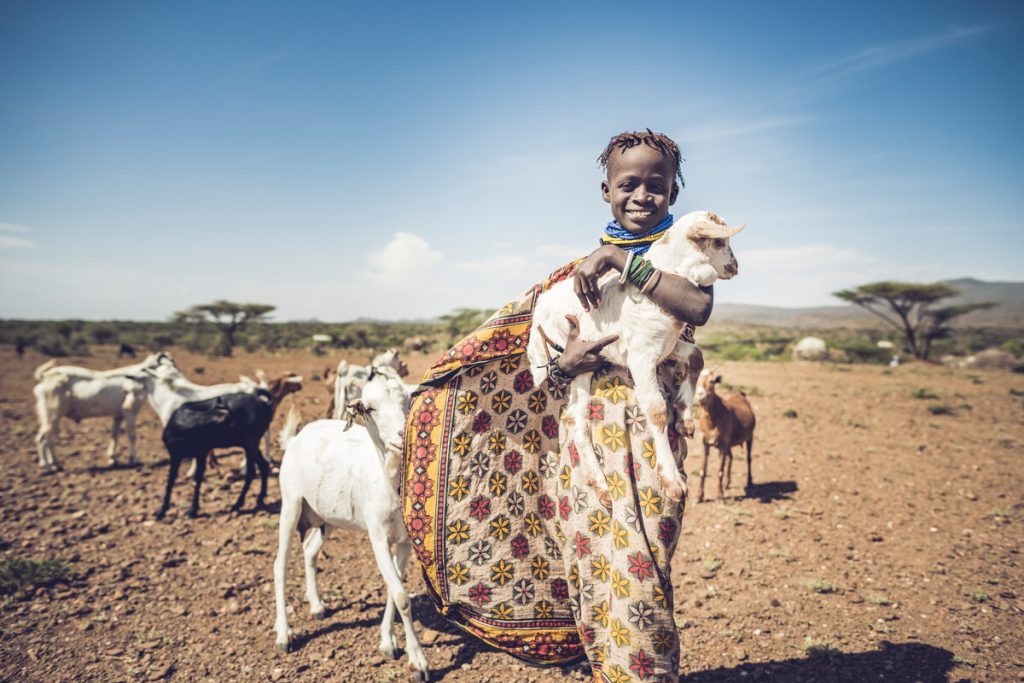
Over the last 12 years, we’ve developed a robust agricultural program in the region that helps expand and diversify the Turkana diet beyond traditional food sources, as well as teach desert farming techniques to help conserve water.
We’ve also bred drought-resistant goats that can survive for longer periods of time without water and launched poultry farming and beekeeping groups that are not only helping the people of Turkana diversify their diets, but also earn income from sustainable food sources. These innovative, culturally-relevant solutions work for the unique challenges and needs of the population and have saved lives in the face of more recent famine and drought.
Grassroots interventions like the ones in Turkana not only honor local knowledge, culture and community resources, but they also pave the way to break the cycle of Western aid that disempowers so many communities in the developing world.
Becoming a Better Partner
In 2010, African economist Dambisa Moyo wrote in her book, Dead Aid, about the broken systems that keep many communities trapped in cycles of dependence on outside aid:
“Africa is addicted to aid. For the past sixty years it has been fed aid. Like any addict it needs and depends on its regular fix, finding it hard, if not impossible, to contemplate existence in an aid-less world. In Africa, the West has found its perfect client to deal to.”
These words, though difficult and perhaps a bit controversial, echo all too true for many development practitioners who frequently hear petitions for food and money when first entering new communities.
It’s also precisely why, when we first enter communities, we begin by bringing local churches together to discuss the ways in which they can work together to solve their own problems. In fact, local pastors, community leaders and a global network of over 95,000 local volunteers, are responsible for the implementation of our programs around the world.
What’s more, 95% of our staff are local to the communities in which they work. Not only do they have an inside voice and understanding that no outside organization can bring, they also bring a passionate commitment for seeing their communities thrive. They will remain in their communities long after we depart — creating, leading and sustaining community efforts toward change.
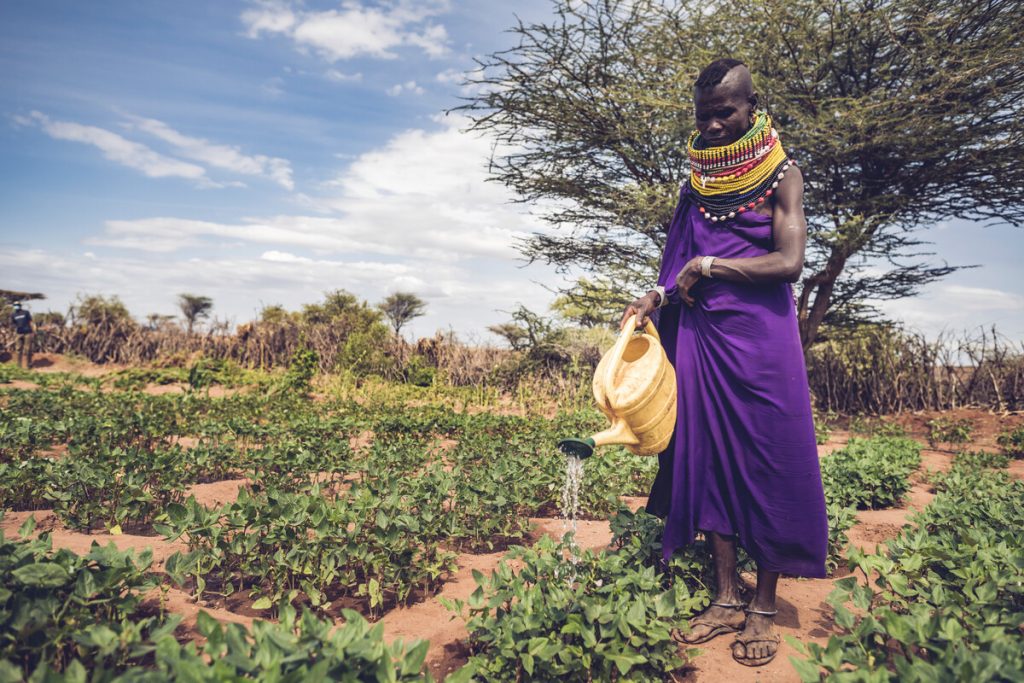
World Relief’s Commitment to Lasting Change
Our world today is obsessed with quick fixes, but at World Relief, we’re fighting for change that lasts. Today, drought is once again threatening severe famine as Turkana. What’s more, the war in Ukraine has caused food prices to spike and rates of malnutrition have increased among children.
And yet, in the imdst of renewed crisis, local churches are rising to the occasion, meeting needs and developing solutions to care for those who need it. Micah Kachoi, World Relief Kenya’s Church Empowerment Zone Coordinator in Turkana said:
“[Churches] are thinking outside the box and asking, ‘What can we do?’
Despite the food shortage and drought, churches are still reaching out to identify the vulnerable people within their communities and mobilizing resources like food, clothing and medical care to support large populations of people who are suffering.”
At World Relief, we refuse to pour time, resources and money into short-term, misdirected solutions in efforts to address complex long-term problems. We believe the biggest problems of our world — disasters, extreme poverty, violence, oppression and mass displacement — have to be tackled at the root, with locally-driven sustainable solutions.
Only then can we ensure that projects like the Turkana fishery never happen again. Yes, this approach takes time. Yes, it is difficult to measure. Yes, in our fast-paced, results-driven culture of immediate gratification, it is hard. But we do it because we know that this approach is transformational — both today and for generations to come.
Thank you for your commitment to creating change that lasts. We could not do this work without you.
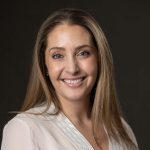
Francesca Albano joined World Relief in 2016 and has played a variety of roles with progressively expanding responsibilities. She is a passionate storyteller and cross-cultural communicator, having spent much of her childhood in Kenya and the U.K., before immigrating to the U.S. as a teenager. She holds a B.A. in Anthropology and International Affairs from Colby College and an M.A in Strategic Marketing Communications from Georgetown University, and is also a Storybrand Certified Guide. Today, her passions and expertise converge to help us tell the story of what God is doing through World Relief and the local church all around the world. She is deeply committed to stewarding this story, and the stories of those we serve, with great care and dignity as we also seek to inform, inspire and invite others to come alongside the work of World Relief. She lives close to Boston with her husband, Joe, and son, Teddy.
Was Jesus a Refugee?
“Jesus Was a Refugee.” Recently, I’ve seen that message all over — on billboards, TV ads, on t-shirts, debated on social media and beyond. Much of this messaging is part of a broader campaign called He Gets Us that aims to help people recognize that Jesus was a human being who can identify with us in our humanity.
That’s a powerful reality for the more than 32 million refugees in our world today, a number unprecedented in recorded history. Jesus “gets” them because, early in his human experience, the Gospel of Matthew tells us that he was forced to flee the threat of Herod’s persecution. He was carried by Joseph and Mary to Egypt, beyond Herod’s dominion, where they would be safe from the genocide inflicted by a jealous ruler on the little boys of Bethlehem.
Many of today’s 32 million refugees know viscerally what it means to awaken in the middle of the night and to flee with what little they could carry, as an angel instructed Joseph to do. To feel danger just behind them. To complete a grueling journey only to arrive in a new land and a new culture with the ongoing grief of the loss of one’s homeland. Jesus presumably lived all of that in his fully human flesh as a small child. And millions today find solace in that reality. He gets them.
But was Jesus really a refugee?
We now have formal legal definitions for the term “refugee” in both U.S. and international law: refugees are those outside of their countries of origin who are unable or unwilling to return because of a well-founded fear of persecution on account of their race, religion, political opinion, nationality or membership in a particular social group. But, of course, these definitions did not exist when the holy family made their journey.
Some, especially on social media, have vehemently insisted that Jesus was not a refugee — perhaps defensive at the implication that their preferred refugee and immigration policies to keep most, if not all, refugees out might actually have harmed the incarnate God.
But while it is clear from the biblical text that Jesus was displaced by a credible threat of persecution, it’s fair to ask just how he would fare under our contemporary policies — as theologian Glenn Butner Jr. does in a new book, Jesus the Refugee: Ancient Injustice and Modern Solidarity.
Butner argues that Jesus largely satisfies the contemporary legal definition of a refugee, but it’s debatable whether the journey to Egypt took him “outside of his country of origin,” since Egypt and Bethlehem were both part of the Roman Empire. Perhaps it’s more precise to characterize the holy family as “Internally Displaced Persons” — those, including more than 60 million people in our world today, who have been forced to flee their homes but remain within the boundaries of their countries.
Would Jesus have faced the barriers many families fleeing persecution face today?
Perhaps Jesus was actually an asylum seeker: asylum seekers profess to meet the definition of a refugee. They say that they’re afraid of persecution on account of one of the enumerated grounds — but they’re not ensured protection under the law unless and until they have demonstrated (to the satisfaction of the governing authorities of the country where they hope to find refuge) that they indeed qualify. Sometimes they lack documentary evidence of the credibility of their fear. Would Joseph have cited an angelic message as his evidence that persecution was likely for little boys in Bethlehem? Would that have satisfied an Egyptian immigration judge?
Fortunately for our Lord and Savior and his earthly parents, there’s no evidence in the biblical text that they faced any barriers to finding refuge in Egypt. But the Gospel of Matthew gives us very few details about their experience there. We’re left to speculate: were they welcomed, seen as a potential threat or simply ignored? Did Jesus learn to speak his first words with a different accent than his parents? Did Joseph easily find work, or was he told that he would be “stealing” a job from an Egyptian carpenter?
Decades later, in one of his final sermons before his crucifixion, Jesus commends certain individuals for having welcomed him when he was a stranger. The disciples are confused: “When did we see you a stranger and invite you in, or needing clothes and clothe you?” (Matthew 25:38). They did so, Jesus says, when they welcomed one of “the least of these brothers and sisters of mine” (Matthew 25:40). Jesus identifies himself perpetually with the vulnerable and the stranger — which, at least early in his life, he himself was.
Does Jesus’ story shape how we respond to refugees and other immigrants?
Whether Jesus would satisfy the precise legal definition of a refugee or not, what’s clear for those of us who profess to follow him today is that an unprecedented crisis of forced migration — with more than 100 million people forced from their homes, experiencing displacement similar to what Jesus experienced as a child — presents an unprecedented opportunity to demonstrate love for Jesus himself.
At World Relief, it’s our great privilege to partner with local churches both across the United States and in various other parts of the world to welcome and care for refugees and others who have been displaced. From our U.S. refugee resettlement program’s foundations in the 1970s, we — and the tens of thousands of church-based volunteers who have partnered with us — have resettled more than 300,000 individuals, motivated by Jesus’ challenging words in Matthew 25. As Evelyn Mangham, the cofounder of World Relief’s refugee resettlement program said, the Christian response to an unprecedented global refugee crisis is “simple”:
“Respond to what Jesus said, that’s all: ‘I was hungry, and you gave me something to eat. I was thirsty and you gave me something to drink. I was a stranger’ — refugee — ‘and you took me in… Inasmuch as you did unto of the least of these my brethren, you did unto me.’ It’s simple obedience.”
Are you ready to create a more welcoming and just world for refugees and other vulnerable immigrants? Learn how you can join us today.

Myal Greene has a deep desire to see churches worldwide equipped, empowered, and engaged in meeting the needs of vulnerable families in their communities. In 2021, he became President and CEO after serving for fourteen years with the organization. While living in Rwanda for eight years, he developed World Relief’s innovative church-based programming model that is currently used in nine countries. He also spent six years in leadership roles within the international programs division. He has previous experience working with the U.S. Government. He holds B.S. in Finance from Lehigh University and an M.A. from Fuller Theological Seminary in Global Leadership. He and his wife Sharon and have three children.
Go Far, Go Deep, Go Together in 2023
When I was a student at Fuller Theological Seminary, one of my professors, Bryant Myers, taught me that, “At the heart of poverty is broken relationships.”
Years later, that teaching shapes the way I see the world and the way I lead at World Relief.
Myers taught that before the fall, God established five foundational relationships that each person was created to live within: relationship with God, with self, with others, with community and with creation.
When these relationships function properly, they make way for human flourishing. But when one or more of them is broken, they precipitate all types of poverty in our lives and in the lives of others:
- Broken relationships with others can cause conflicts.
- Broken relationships with creation deprive us of God’s life-giving intention for the earth — that everyone has access to beauty and sustainable food, water and resources.
- Broken relationships with ourselves mar our ability to see the potential for change and transformation.
- And broken relationships with God keep us from experiencing grace and restoration.
Current Crises, Broken Relationships
Over the last year, we’ve talked at length about how COVID, conflict and climate change have converged to create the worst humanitarian crisis we’ve seen in decades.
In these crises, we see evidence of broken relationships. War displaces families from their homes. Communities suffer the effects of natural disasters. Women and girls face increased violence and discrimination. Our own brokenness often leaves us feeling hopeless and unable to engage, while pride and division prevent us from seeking collaborative solutions to these complex problems.
It’s clear that the old paradigms of providing humanitarian aid may not be enough. If we want to move forward, we must embrace a new vision. We must remember that a flourishing world is a connected world, and it takes all of us to create change that lasts.
At World Relief, we’ve long been committed to addressing our world’s problems holistically, making way for people and communities to restore relationships and flourish. For nearly 80 years, we’ve been moving with local churches and community leaders as they create lasting change, and many of you have moved right along with us.
As we settle into the new year, the problems facing us in 2022 have not been left behind. But thanks to the generosity of people like you, World Relief is poised and ready to meet the emerging needs of our world. Together, we will go far, go deep and go together in 2023, and I’m eager to tell you how.
Go Far: Ukraine, Chad and Ethiopia
Since February 2022, World Relief has partnered with local churches and Christian agencies in Ukraine, responding to the devastating war that continues to unfold. This summer, it became evident that a long-term presence in Ukraine was necessary to meet the immense needs that will extend for years to come.
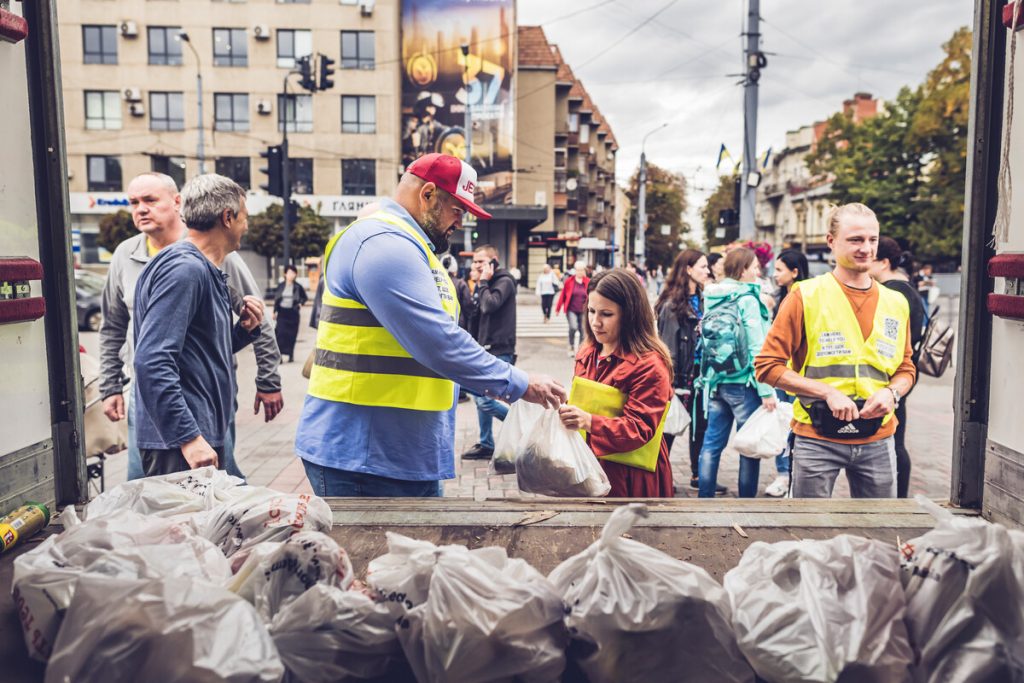
World Relief has decades of experience working in current and post-conflict settings. Our team in Ukraine will build upon our technical experience to increase the capacity of local churches to meet the physical and spiritual needs of those impacted by the war.
In Chad, we’ve also found an opportunity to strengthen local churches to meet the needs of the most vulnerable.
The Southern portion of Chad is a Christian-majority region where population density is high and humanitarian actors are few. Existing local, faith-based NGOs are in need of capacity-building support from an international Christian NGO like World Relief to scale and expand impact.
We expect the Chad office to open in early 2023, and we will also be moving forward with plans to open an office in Ethiopia as well.
Go Deep: Mental Health Counseling and Disability Inclusion
While others might focus on one area of intervention or only provide immediate assistance, we remain committed to responding to needs holistically with proven solutions that last.
For refugees and other immigrants, this means addressing the profound physical and psychological trauma many endure when they are forced to leave their homes and rebuild their lives in an entirely new culture.
World Relief offices in Chicagoland and North Carolina have been providing mental health counseling to refugees for more than 20 years. In 2023, we’re expanding this service line to more offices to better meet the needs of those experiencing displacement.
Our commitment to thriving societies is also reflected in the depth of our disability-inclusive programming. People with disabilities represent some of the most marginalized, making up 20% of the world’s poorest in developing countries.
World Relief Malawi piloted disability-inclusive programming in 2019, reaching more than 400 people through church-led initiatives in the first two years. Since then, we have expanded disability-inclusive programming to church networks in Burundi and Rwanda, and are making plans to train churches in six more countries across the globe.
Go Together: Creating Lasting Change
At the heart of our commitment to going further and deeper is our commitment to going together, equipping the individual and collective expressions of the church to live out their call to serve in both word and deed.
Our newly formed Church and Community Engagement Team is working hard to engage more people and more congregations in creating welcoming communities for immigrants in the U.S.
Globally, our Outreach Group Initiative continues to equip volunteers to meet the spiritual and physical needs of their neighbors, while savings groups are bringing people together, providing support and friendship as communities are transformed economically.
And then there’s you — as you move forward this new year, my prayer is that you would see yourself as part of a global movement that is creating change across the globe. I pray you’d find ways to strengthen the relational connections in your own life so the ripple effects of lasting change can continue to expand.
The challenges we face are great. But, by the power of Jesus, hope is even greater when we go forward together.
Do you want to be a part of this global movement? You can make a difference in 2023 by joining World Relief. Learn more and give today.

Myal Greene has a deep desire to see churches worldwide equipped, empowered, and engaged in meeting the needs of vulnerable families in their communities. In 2021, he became President and CEO after serving for fourteen years with the organization. While living in Rwanda for eight years, he developed World Relief’s innovative church-based programming model that is currently used in nine countries. He also spent six years in leadership roles within the international programs division. He has previous experience working with the U.S. Government. He holds B.S. in Finance from Lehigh University and an M.A. from Fuller Theological Seminary in Global Leadership. He and his wife Sharon and have three children.
What does a year hold?
When I consider the new year, I’m struck by how little we know about what it will hold. In 2019, we had no idea that the pandemic would shut down the world in 2020. Before 2020, we had no idea that Afghanistan would fall in 2021. In 2021, we had no idea that Ukraine would be invaded in 2022. As we face 2023, we have no idea what might lie ahead.
Beyond these more public events, it is an unfortunate truth that the world is riddled with conflict, poverty, corruption, and environmental realities that have been driving people from their homes for generations. The People of Myanmar, Venezuela, Darfur, Iran, Eritrea, and other places are forced daily to display a resilience many of us will never know.
So, what do we do with these realities?
What do we do with the certainty we can’t know the future and the heart-breaking crisis of mass displacement? It can be overwhelming and we can find ourselves focusing on what we do not know. In these moments I ask myself, “Who am I becoming?” “How will I lean into trusting God this year?” “How can I be a person of faith in the year ahead?”. Questions more easily asked than answered.
But in my life, I have found that amid uncertain futures, it is vital that we hold to our core values. It is vital that we lean into learning to trust God and others. When tethered to truth, we can navigate the uncertainties ahead with grace, confidence, and hope. When bound to one another, we can endure challenges, create lasting solutions, and make the world a better place.
Values We Hold
All people have sacred worth.
For those of us who follow Jesus, we believe that every person is created in the image of God and worthy of welcome. There are no qualifiers here. As a popular quote from an unknown author says “You will never look in the eyes of a person that God does not love.” This means that every person who comes to the US is someone God loves. Every immigrant, refugee, or asylum seeker has unspeakable value and potential. To not extend welcome is to dishonor the image of God in them.
We are made for connection.
John Donne’s poem “No man (or woman) is an island” captures this reality beautifully. We are not made for isolation. Each of us is a part of something bigger. Each of us has a part to play in this world. We are designed to be together. This means at least two things. First, the work of welcoming immigrants is something we do together, relying on each other’s strengths and resilience. And second, building relationships with those around us, immigrants and native-born alike, is sacred work. When we build relationships with one another that are meaningful and mutually transformative, we are participating in a broader multigenerational journey toward a more just world.
We are more powerful together.
My first encounter with the work of World Relief was as a volunteer. I remember a wide range of emotions when I started. Hopeful, eager, anxious, overwhelmed, grateful . . . the list could go on. But one thing that jumps out to me from that time is how much of an impact the whole community of World Relief was having. Sure, I was giving a few hours a week. But alongside others, we were giving so much more. Over my years serving and leading here, I have seen the power of a community to make lasting change. One example of this is a recent study showing how more evangelical Christians are now looking to scripture for their views on immigration, an area of concerted advocacy work for World Relief. We can create something far more beautiful than we can on our own, together.
We All Have a Part to Play
When we hold space for these values to form us, I believe we will find ourselves ready for the year ahead. In the midst of economic uncertainty and a longer-then-we-would-like pandemic recovery, we remain ready to welcome.
In 2023, I anticipate discovering new challenges and witnessing new successes. I embrace the reality that I can’t know the future. I hold to the truth that no matter what comes, we are not alone. We have hope, and we will continue to serve as we have over the past 43 years. I am grateful beyond words for you and the whole World Relief community. And I know that together, we will continue to embody welcome, provide vital services for immigrants, and create a community we can all be grateful for.
Find Your Part to Play
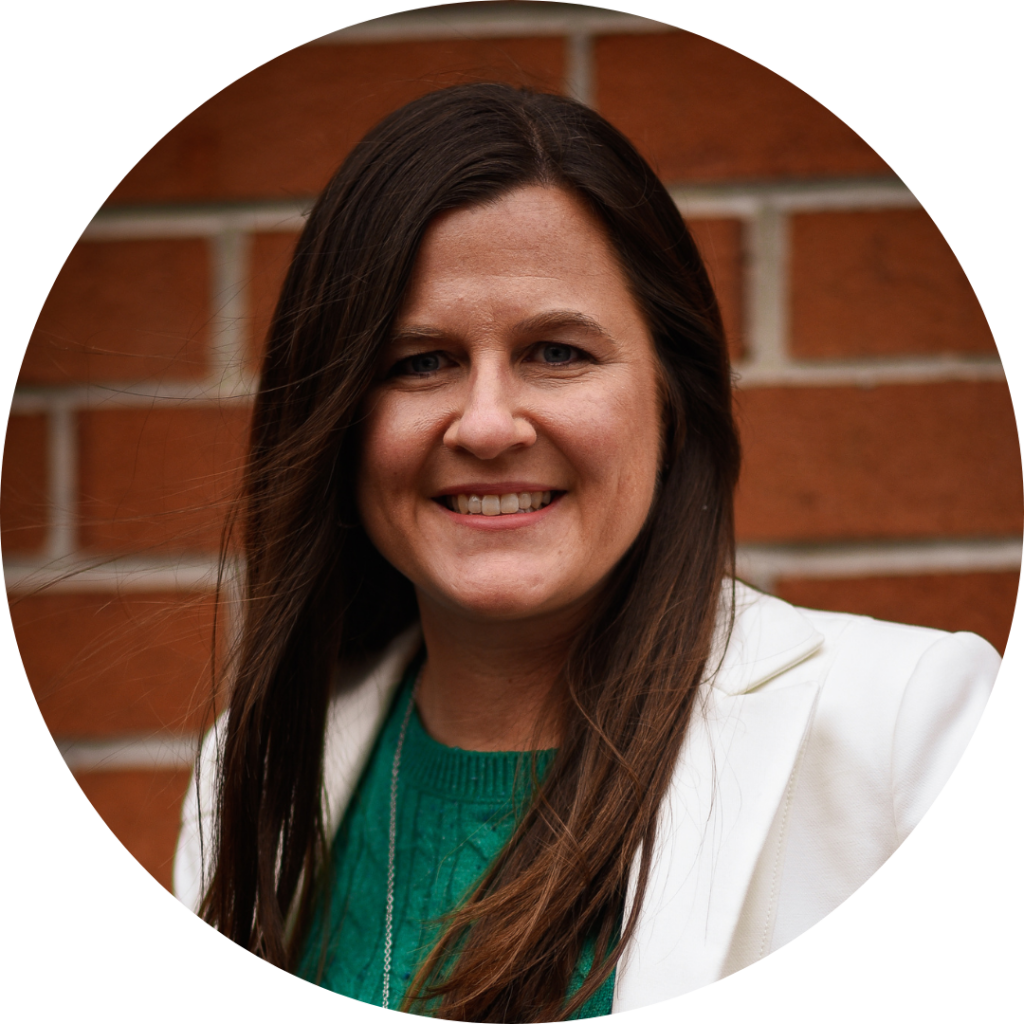
Susan Sperry is the Executive Director of World Relief Chicagoland, a faith-based organization committed to empowering the church and community to serve immigrants in vulnerable situations. She leads World Relief’s three locations in Chicago, DuPage County, and Aurora to provide vital services, bring people together, and build welcoming communities. Susan has served at World Relief since 2001, facilitating the resettlement of thousands of refugees and mobilizing hundreds of volunteers and churches to serve their neighbors. She has her MS in Learning and Organizational Change from Northwestern University, and her undergraduate degree from Wheaton College. She loves working alongside teams to navigate the human side of change and aspires to be a life-long learner.
Covid, Conflict and Climate Change: How the Church Can Be Hope Amidst Converging Crises
Two years ago, when COVID-19 was just emerging as a global crisis, many of us in the non-profit sector speculated how the pandemic would shape our world. We threw around the phrase “new normal,” despite not having any idea what that would look like over the next month, let alone in the years to come.
Since then, we’ve watched as three converging crises have dramatically impacted the lives of some of the world’s most vulnerable — COVID, conflict and climate change.
The UN estimates that the number of people living in extreme poverty has increased by 100 million as a direct result of the pandemic — the first time in my lifetime this indicator has risen.
Global conflict is also on the rise, with more coups occurring worldwide than any previous year since 1999. Conflicts in Ukraine and Afghanistan have increased the total number of displaced people from 84 million to more than 100 million.
We are currently facing the worst displacement crisis in recorded history, and all the while, climate change continues to exacerbate these crises and more.
A Convergence of Crisis
At World Relief, we’ve seen firsthand how these three intersecting crises have converged to produce unimaginable suffering in vulnerable communities worldwide.
The war in Ukraine cut off much-needed grain exports, intensifying food shortages in places like Turkana where prolonged drought is killing livestock and putting people at risk of malnutrition and starvation.
In South Sudan, flooding caused by increased rainfall has destroyed land and local infrastructure, leaving farmers and pastoralists to feud over fewer resources.
And in places like Democratic Republic of Congo, the COVID-19 pandemic has further depressed an economy already bending under the weight of instability fueled by ongoing conflicts.
The situation is grim. If you’re feeling weary or overburdened, you are not alone. So many of us are feeling the weight of the world’s suffering on our shoulders, and yet, I believe we can still have hope.
In the midst of these complex crises, I believe God still moves through the church to bring hope and healing to the world. I believe this because I see it every day.
Hope Amidst Converging Crises
I see it in Rwanda where the church remains a source of help, hope and information in the fight against COVID-19. As a result of church-led efforts, we support across East Africa, nearly 100,000 people have been vaccinated.
I see it in Kenya, as communities face life-altering climate crises such as drought and resulting famine. There, the church is at the center, revealing new transformative ways of living and teaching people like Lomita to grow drought-resistant crops to restore their bodies while also providing spiritual food to nurture their souls.
I see it in Democratic Republic of Congo, where, several years ago I visited Rutchuru and listened as community members recounted terrible acts of murder committed by rebel groups just months prior to my arrival.
Today, in that same community, World Relief staff are unifying pastors from different tribes, families and denominations — some of whom were once in open conflict with one another — and facilitating a process of communal healing.
These same churches are now supporting village peace committees that help resolve conflicts in the absence of effective governance structures.
And of course, I see it right here in the U.S., as refugees and immigrants arrive in need of a safe place to call home. Here, the church is revealing time and time again that better days are ahead as they help people rebuild their lives.
Jesus Says Take Heart
In the hours leading up to his death on the cross, Jesus took a walk with his disciples and told them of the hardships they would soon be facing. He said, “I have told you these things, so that in me you may have peace. In this world you will have trouble. But take heart! I have overcome the world.”
World Relief was born to respond to urgent suffering and overwhelming humanitarian needs. Today, we find ourselves once again facing a crisis of historical proportions, and in the midst of it we feel God calling us, again, to take heart! To go further and reach deeper as together, we reach more people in this time of immense need.
Where others might pause in the midst of adversity, our faith in Jesus compels us to keep going, moving toward a ministry that leads to the restoration of others.
The challenges of COVID-19, conflict and climate change are great. But together, I believe we can move forward as the church Jesus intended us to be — not divided by partisanship, but as a body of compassionate believers, united in the Spirit to bring hope and restoration to those in physical and spiritual need around the world.
Join World Relief this season by signing up for our exclusive 4-part podcast series. Leaders from across the globe share how God is creating change through local churches in their communities. In the midst of converging crisis, God still moves through the church, and you’re invited to be a part of it.

Myal Greene has a deep desire to see churches worldwide equipped, empowered, and engaged in meeting the needs of vulnerable families in their communities. In 2021, he became President and CEO after serving for fourteen years with the organization. While living in Rwanda for eight years, he developed World Relief’s innovative church-based programming model that is currently used in nine countries. He also spent six years in leadership roles within the international programs division. He has previous experience working with the U.S. Government. He holds B.S. in Finance from Lehigh University and an M.A. from Fuller Theological Seminary in Global Leadership. He and his wife Sharon and have three children.
World Relief’s Commitment to Environmental Stewardship
And God said, “Let the water teem with living creatures, and let birds fly above the earth across the vault of the sky.” So God created the great creatures of the sea and every living thing with which the water teems and that moves about in it, according to their kinds, and every winged bird according to its kind. And God saw that it was good. – Genesis 1:20-21
Caring for Creation
Creation care is one of the core tenets of Christian witness. Indeed, scripture is clear. God gave humans dominion over the earth “to work it and take care of it ” (Genesis 2:15). And In 2010, the Christian commitment to creation care was codified in the Lausanne Cape Town Commitment, which stated:
All human beings are to be stewards of the rich abundance of God’s good creation. We are authorized in using it for the sake of human welfare and needs, …[and] also commanded to care for the earth and all its creatures, because the earth belongs to God, not to us.
Creation is both a beautiful gift for our pleasure and joy and an essential part of the very sustainability of our planet. Yet sadly, the incredible biodiversity that is celebrated in Genesis 1 is no longer as visible as it once was.
At World Relief, we have first-hand experience working with communities facing the devastating effects of increased natural disasters due to climate change in places like Turkana, Haiti, Malawi and South Sudan. Even if we don’t feel the effects of climate change as dramatically as our sisters and brothers in other parts of the world, we share one planet and must acknowledge that our actions have a direct effect on their lives.
Earlier this week, the National Association of Evangelicals, in partnership with World Relief, released Loving the Least of These, a report on the effects of climate change and our responsibility as stewards of God’s creation to care for this earth and those who are suffering as a result of our rapidly changing climate.
World Relief’s Environmental Stewardship Policy
Alongside the process of writing this report, we at World Relief entered into a thoughtful process of research, discussion and analysis, which resulted in the creation of an organizational Environmental Stewardship Policy that World Relief will use to translate its commitments into action and impact.
In July of 2022, World Relief put in place a permanent, cross-departmental environmental working group to elevate environmental stewardship principles and drive awareness, innovation and action across all of our programs and operations around the world. This group will create and standardize an annual environmental stewardship plan with short-, medium- and long-term goals that will:
- set up a program to offset carbon/greenhouse emissions caused by air travel
- identify areas where World Relief can conserve energy and water and increase whenever possible
- increase the use of renewable energy within our office buildings with particular emphasis on heating, lighting, ventilation, office equipment and the use of vehicles
- reduce waste by eliminating single-use plastics and polystyrene within programs and offices over time
- promote responsible procurement of goods and equipment that are the most sustainable over their life cycle, including an emphasis on local procurement
- increase recycling and promote the responsible disposal of waste when needed
- develop a set of advocacy actions on policy issues related to the environment, particularly those policy matters that most affect the vulnerable.
- develop a curriculum that will increase awareness and provide ongoing training and education for staff, volunteers and World Relief church partners
- improve and formalize our efforts to assure that all programs engage the communities and partners we work with in preventing damage to the environment while promoting and practicing conservation and sustainable use of resources
Furthering Our Commitment
On August 6, 2022 World Relief also signed The Climate and Environment Charter for Humanitarian Organizations. This charter was developed by the International Committee of the Red Cross (ICRC) and the International Federation of Red Cross and Red Crescent Societies (IFRC) in 2019 “to support and promote greater climate action within the humanitarian community at large.”
Since that time, some 300 humanitarian organizations have joined the charter. The charter requires that within a year of signing, an organization will “translate the commitments in the Charter into time-bound targets and action plans within a year.”
World Relief will be developing its targets and commitments in a first annual environmental work plan as discussed above and these will be published online on the Charter website.
In signing this charter World Relief joins with other humanitarian organizations including our fellow evangelical humanitarian partner agencies in the Integral Alliance to be able to transform our messaging and commitments into cooperation, action and impact.
Fulfilling Our Call
While matters of the environment have always been a concern and a part of our programs, going forward, environmental stewardship will be an increasingly fundamental part of how World Relief carries out our mission through both policy and action.
We live in an interconnected world — a reality that is continuously becoming more and more clear. The apostle Paul writes in 1 Corinthians that when one of us suffers, all of us suffer.
None of us is exempt from Jesus’ call to love and serve those in need, and right now, one of the best ways we can do this is by understanding the impact of our choices and caring for creation. Together, we can be both the reactive and the proactive people Jesus calls us to be. We can be people who realize that what we do has ripple effects on the most vulnerable people in our world, and then choose to change how we live.
Read more about World Relief’s commitment to environmental stewardship and how the church can address the effects of a changing climate.









